Feb. 27, 2017
This spring will mark 70 years since Frazier Thompson (’47, track & field), the first African-American student to enroll at Notre Dame and the first African-American Monogram winner, graduated from the University.
Thompson passed away in 1991, but his impact at Notre Dame is still felt today through the Frazier Thompson Scholarship Fund, which was established in 1999. The Black Alumni of Notre Dame annually awards scholarships to two undergraduate students in honor of Thompson. The goal of the scholarship is to reduce the financial burden of seniors who have consistently demonstrated academic excellence, all the while contributing to the greater African-American and Notre Dame communities.
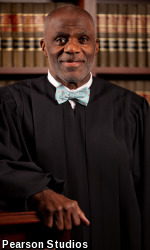 Justice Alan PageNotre Dame students of color also have received scholarship assistance through the Page Education Foundation, which was established in 1988 by former Irish All-American and Minnesota Supreme Court Justice Alan Page (’67, football) and his wife Diane. The Foundation provides financial support in the form of Page Grants to students of color facing incredible barriers to attaining their educational dreams. In return for their awards, the recipients, known as Page Scholars, help develop positive attitudes about education among elementary and middle-school children by volunteering as tutors and mentors in their communities.
Justice Alan PageNotre Dame students of color also have received scholarship assistance through the Page Education Foundation, which was established in 1988 by former Irish All-American and Minnesota Supreme Court Justice Alan Page (’67, football) and his wife Diane. The Foundation provides financial support in the form of Page Grants to students of color facing incredible barriers to attaining their educational dreams. In return for their awards, the recipients, known as Page Scholars, help develop positive attitudes about education among elementary and middle-school children by volunteering as tutors and mentors in their communities.
Page was a vital part of Notre Dame’s 1966 national championship team and is a member of both the College Football Hall of Fame and the Pro Football Hall of Fame. He was elected to the Minnesota Supreme Court in 1992 and was reelected to that position three times before retiring in 2015. For all of his incredible accomplishments away from the gridiron, the Monogram Club in 2016 presented Page with the organization’s highest honor, the Edward “Moose” Krause Distinguished Service Award. 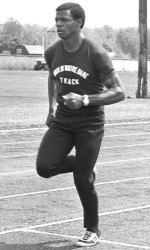 Dr. Bill HurdDr. Bill Hurd (’69, track & field), a world-class sprinter who was Notre Dame’s “athlete of the year ” for 1967-68, received the Moose Krause Award in 2002. Hurd, a noted eye surgeon, was bestowed the honor for his work doing voluntary eye surgery to the poor in Africa, Mexico and Brazil.
Dr. Bill HurdDr. Bill Hurd (’69, track & field), a world-class sprinter who was Notre Dame’s “athlete of the year ” for 1967-68, received the Moose Krause Award in 2002. Hurd, a noted eye surgeon, was bestowed the honor for his work doing voluntary eye surgery to the poor in Africa, Mexico and Brazil.
In 2006, Phyllis (’80, cheerleading) and Jim Stone (’81, football), both former Monogram Club board members, pledged $100,000 to fund the James and Phyllis Stone Endowment for Excellence in Africana Studies. Phyllis was the first African-American female cheerleader at Notre Dame and she currently is a trustee at the University. 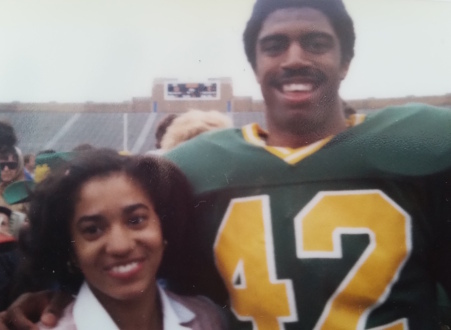 Phyllis and Jim Stone
Phyllis and Jim Stone
All of these individuals are just some examples of the many African-American Monogram winners who have left incredible marks at Notre Dame and beyond. As a way to showcase these individuals and their stories, the Notre Dame Athletics Department in 2009 held a celebration to commemorate over 60 years of black student-athletes at the University. CLICK HERE for more information on the celebration.
The Monogram Club was the driving force behind the celebration and several current or former board/staff members, including Dave Clark (’85, baseball), Bob Lopes (’85, baseball), Chris Smith (’85, football), Marvin Lett (’87, soccer), Darrell Gordon (’88, football), Reggie Brooks (’93, football) and Errol Williams (’98, track & field), were on the committee that organized the events that were held.
A signature element of the celebration was a panel discussion. The panel covered a variety of topics, including the sacrifices made by the first black athletes to break the color barrier, extraordinary achievements by black student-athletes who have gone on to do great work after their athletic careers have ended, and the influence former Notre Dame President Rev. Theodore M. Hesburgh, C.S.C. had in breaking through racial barriers.
In an effort to continue the dialogue surrounding diversity and inclusion efforts at the University, the Monogram Club posed questions to Monogram winners about their experiences. Below are responses from Jes Christian (’14, track & field) and Allen Greene (’99, baseball). Christian, a two-time Monogram winner, began a four-year term on the Monogram Club Board of Directors in the fall of 2016. Greene is a three-time Monogram winner who currently is the director of athletics at the University at Buffalo.
Did you have any difficult experiences at Notre Dame because of your race? Did any of your teammates or fellow student-athletes?
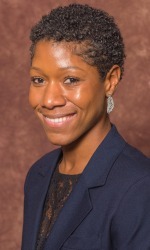 Jes ChristianJC: “I think that all black student-athletes across the country, especially those attending institutions with top-notch athletics programs, face difficulties that are rooted in race. There were multiple times during my four years at Notre Dame where I was mistaken for different black athletes on other teams. There were other times where I was automatically assumed to be an athlete in situations that were totally unrelated to sports and where my non-black teammates were not. It’s easy for people to say that those things happened because I’m tall and I look athletic, but race definitely plays an unfortunate role in those assumptions. Even my black friends who were not student-athletes were subject to those mistakes. Sometimes they work to your advantage. Oftentimes they don’t. Regardless, assumptions based on one’s race definitely take something away from black people: their identity, their accomplishments, and sometimes even their drive to succeed.”
Jes ChristianJC: “I think that all black student-athletes across the country, especially those attending institutions with top-notch athletics programs, face difficulties that are rooted in race. There were multiple times during my four years at Notre Dame where I was mistaken for different black athletes on other teams. There were other times where I was automatically assumed to be an athlete in situations that were totally unrelated to sports and where my non-black teammates were not. It’s easy for people to say that those things happened because I’m tall and I look athletic, but race definitely plays an unfortunate role in those assumptions. Even my black friends who were not student-athletes were subject to those mistakes. Sometimes they work to your advantage. Oftentimes they don’t. Regardless, assumptions based on one’s race definitely take something away from black people: their identity, their accomplishments, and sometimes even their drive to succeed.” 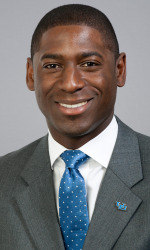 Allen GreeneAG: “I’ve met some lifelong friends at Notre Dame and would not trade my experiences in South Bend for anything in the world. That said, no place is perfect, and during my time at ND, I only experienced one interaction that I would consider ‘difficult’. It was a short-lived interaction with a student in the Stepan Lot, who had a little too much to drink on this particular Friday night. He had a few choice derogatory words for me and my teammate (who was also black), but we knew it wasn’t worth our time, energy or risk to respond to his ignorance.”
Allen GreeneAG: “I’ve met some lifelong friends at Notre Dame and would not trade my experiences in South Bend for anything in the world. That said, no place is perfect, and during my time at ND, I only experienced one interaction that I would consider ‘difficult’. It was a short-lived interaction with a student in the Stepan Lot, who had a little too much to drink on this particular Friday night. He had a few choice derogatory words for me and my teammate (who was also black), but we knew it wasn’t worth our time, energy or risk to respond to his ignorance.”
What are the struggles and stereotypes facing black students/student-athletes at Notre Dame and how is Notre Dame moving forward in its efforts to get past the stereotypes?
JC: “I believe that one of the biggest struggles that black students/student-athletes faced during my time at Notre Dame was how to navigate through perceived assumptions. Even if a black student/student-athlete hasn’t experienced being mistaken for another black student or being treated negatively because of race, I think that seeing and hearing about those experiences from friends at Notre Dame ââ’¬” and in life ââ’¬” becomes a constant part of one’s psyche. There’s always that little voice in your head when you walk into a room or onto a field as a minority that reminds you that people think you were unfairly admitted into the school because of the color of your skin and that you’re not smart enough to be here. That you’re good at sports only because of the color of your skin. That somehow you don’t deserve what you’ve gotten, that you haven’t worked hard and that you aren’t capable of success.
“A few years ago I sat down with someone who was dedicated to Notre Dame athletics. We discussed his concern about the academic struggles that some black student-athletes face because they fall victim to stereotypes and truly believe that they can’t do well or aren’t working hard enough. Some of these student-athletes were first-generation, some from under-resourced communities, and others were well-off and had achieved great things both on and off of the field to get to Notre Dame. We talked about how to overcome this issue, and a huge part of the solution, we both agreed, could be discussing and dismissing this mindset in front of as many people as possible. I believe that there were people at Notre Dame that were doing that before our conversation and I believe that there were more doing so afterwards.
“I also believe that the University helps black students and athletes to overcome this struggle every time they revisit the accomplishments of black students like former Notre Dame valedictorian Katie Washington ’10 and student-athletes like former Notre Dame football star Justice Alan Page who both accomplished amazing things during and after their time at Notre Dame. Those stories inspire black Domers to be great.”
AG: “The stereotypes and struggles at Notre Dame for black students, particularly athletes, I would presume are no different than any other college campus in America with a thriving athletics program. Those issues center around the following:
– Foreign Environment: Though not all, many black student-athletes ââ’¬” particularly football and basketball ââ’¬” are not accustom to the environment at Notre Dame. The interaction with so many people, in a concentrated setting who are not like them presents its challenges.
– Dumb Jock: Dealing with the perception that black student-athletes at Notre Dame are unintelligent.
– Assumptions of Sport: I was always asked if I played football or basketball, to the point where fans would ask for my autograph on ‘Football Fridays’ because they assumed ââ’¬” and often times insisted ââ’¬” I was a football player.”
What does diversity mean to you? What has Notre Dame done to make the University a more diverse place?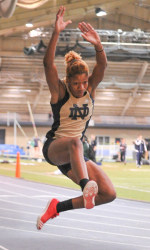 JC: “Diversity to me means never walking into a place and experiencing an overwhelming amount of sameness. I have never wanted to be surrounded entirely by people who look, speak, believe and think like I do. Similarly, I have never wanted to be surrounded entirely by people who are very similar to one another and nothing like me. The common thread at Notre Dame is, and should always be the love that the Notre Dame community has for the University and the shared appreciation for Notre Dame’s values and resources. I believe that it is and, beyond that, that Notre Dame is constantly trying to acknowledge and celebrate the different cultures, experiences and opinions of Notre Dame community members.”
JC: “Diversity to me means never walking into a place and experiencing an overwhelming amount of sameness. I have never wanted to be surrounded entirely by people who look, speak, believe and think like I do. Similarly, I have never wanted to be surrounded entirely by people who are very similar to one another and nothing like me. The common thread at Notre Dame is, and should always be the love that the Notre Dame community has for the University and the shared appreciation for Notre Dame’s values and resources. I believe that it is and, beyond that, that Notre Dame is constantly trying to acknowledge and celebrate the different cultures, experiences and opinions of Notre Dame community members.”
AG: “Diversity is a state of mind, an attitude where we all are welcome. It’s a lifestyle and a belief in the value of differences.”
In terms of diversity and inclusion, how did you view Notre Dame before attending the University? How did those views change or did they stay the same?
JC: “My views about diversity and inclusion changed when I came to Notre Dame in that I began to look at conservative views as an aspect of diversity. Prior to attending Notre Dame, the school that I attended was driven very heavily by liberal values and individuals. There were very few conservative students and those that existed still embraced diverse principles. We were united in our principles, our hometowns, local stores and favorite teams, which was incredible. When I came to Notre Dame, however, I met a much more geographically diverse grouping of people. I met people that I thought were close-minded and offended me in the same room where I met people that wanted everything for everyone and inspired me. The conversations that we had and the opinions that we considered were stronger for it. They gave me a much more holistic outlook on life.” 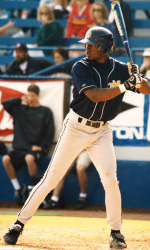 AG: “Shockingly, Notre Dame was not on my radar as a high school student until I was recruited. Fortunately, I entered Notre Dame with an open mind, unsure of what world I was entering. Over time, I met a number of people from around the country and across the globe. We had enlightening cultural discussions and at times shared in mutual struggles. It was with those interactions that the essence of Notre Dame was revealed ââ’¬” diversity and inclusion mattered based on the types of students Notre Dame attracted and admitted.”
AG: “Shockingly, Notre Dame was not on my radar as a high school student until I was recruited. Fortunately, I entered Notre Dame with an open mind, unsure of what world I was entering. Over time, I met a number of people from around the country and across the globe. We had enlightening cultural discussions and at times shared in mutual struggles. It was with those interactions that the essence of Notre Dame was revealed ââ’¬” diversity and inclusion mattered based on the types of students Notre Dame attracted and admitted.”
How can the Monogram Club assist with the diversity and inclusion efforts at Notre Dame?
AG: “The Monogram Club can be helpful in many respects. Most importantly, I believe the Monogram Club can continue to shine a spotlight on the many success stories of the diverse former student-athlete pool. Continue to foster interaction with current and former student-athletes, and ensure that constructive dialogue flows back and forth.
“Efforts to foster a diverse and inclusive culture is a journey in which the finish line will never be reached ââ’¬” and that’s okay. The important aspect to remember is to think about the number of lives that have been changed and will continue to be changed during the course of this never-ending journey. I’m incredibly humbled to be associated with the University of Notre Dame and proud to be a member of the Monogram Club. My life continues to be blessed because of my experiences at Our Lady’s University.”
The following video was produced in 2009 in conjunction with the 60th Anniversary Celebration of Black Student-Athletes at Notre Dame.
–ND–







